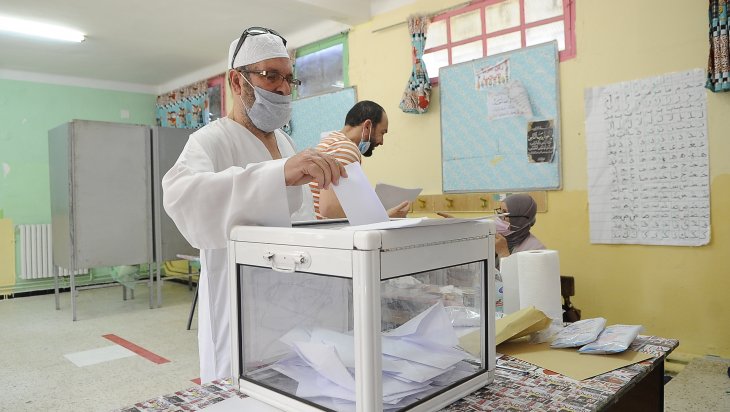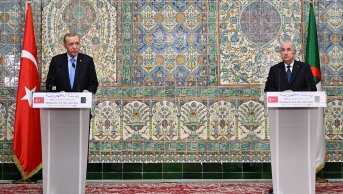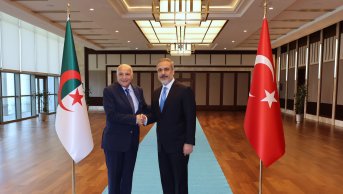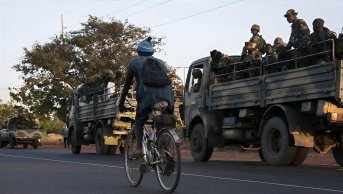Algeria: Political Immobility and Credibility of Elections

Algeria’s early legislative election results of 12 June left analysts in a dilemma in terms of possible scenarios of a break-through concerning the ongoing political immobility. These early elections were the result of a year and a half of political and institutional reforms led by President Abdelmadjid Tebboune, Algeria's 8th president since the country’s independence in 1962 The elections were followed by two national polls where voters had their say despite the high abstention rates that have been haunting politicians and the new administration. The legislative elections of June 12, however, were the outcome of a massive peaceful protest against the political system created by Ex-president Abdelaziz Bouteflika in 2019, who ruled the country for two decades, following a decade of political violence in the ’90s which the Algerians call “The Red Decade”. These three decades of political distress made Algerian voters leave politics to “professional” politicians.
Doubt and credibility of elections
This helps us better understand the current political climate in the post-Bouteflika period. There are certain allegations regarding the military’s role in the institutional crisis of 2019 during the nine months of Hirak (mobility), and its direct political and institutional consequences that led to the fall of the Bouteflika administration. According to these allegations, the early legislative elections of 12 June were part of the road-map drawn up by the late Chief of Staff and Algeria’s strongman General Ahmed Gaïd Salah, following the ex-president’s “resignation” on 2 April 2019.
Nevertheless, the majority of Algerian voters are still haunted by free and fair elections. Three dec- ades ago, the interruption of the political and constitutional reforms led by former President Chadli Bendjedid had created a real dynamic of peaceful change and a ray of hope for Algeria for the 21st century. Yet, the historical legislative elections that ensued put an end to the FLN rule in 1991 Algerians voted en masse for the FIS party, ending thirty years of corruption and incompetency after all. Algerian voters at the time did not necessarily vote for the FIS party for its political agenda, but wanted to punish the FLN party and its nomenklatura as they believed that their vote counted this time.
It’s important to draw a parallel between the legislative elections of 1991 and 2021 In 1991, under the constitution of 1989, all political parties participated and people voted freely for their party of choice, wishing to see a change. In 2021, voters seem divided ideologically and at a loss in the face of the regime’s reforms in the post-Hirak period.
Nevertheless, with the 2021 legislative elections—despite the high rate of abstention of 75%—the process continued and will result in the formation of a new government according to the Article 103 of the amended constitution of 2020, which will be constitutionally checked by Algeria’s 9th legislative counsel.
Low participation has allowed the historical party National Liberation Front (FLN) to obtain 98 seats in the new legislative counsel, followed by the independent candidates in the second place and other political parties like MSP, RND, al-Moustaqbel and al-Bina respectively. This will bring back the old days of Bouteflika’s system and the FLN-rule for Algerian voters, as a new presidential alliance is on the horizon. However, the opponents and average citizens in general consider the measures of President Abdelmadjid Tebboune as a new touch to the old system rather a than completely “new” one. The nomination of Mr. Ramtane Lamamra, former Minister of Foreign Affairs between 2013 and 2017 during Bouteflika administration, back to his former post by Prime Minister Aymen Benabderrahmane’s government has raised legitimate concerns among the skeptical groups and the opponents of the Tebboune administration.
People’s opinion vs. regime’s response
In this political climate, an interesting equation may emerge between FLN (and its affiliates) and the independent members that came out second in the race, as the FLN and its affiliates represent the bulwarks of the regime, with many independent and national-Islamist MPs who already seem to be forming a presidential alliance for the implementation of the political program. Leaving the MSP party alone to form a symbolic opposition bloc to Prime Minister Aymen Benabderrahmane’s government.
Ironically, all political parties who decided to join the president’s program and support his Premiership ran against President Abdelmadjid Tebboune in the presidential elections of December 2019 National unity obliges!
The new People’s National Assembly is in an odd representation, in other words, it is without a real checks and balance system and without an opposition in the Parliament. Is this because of the boycott of the secular parties which prefer to remain as a critical voice in the local media with very little impact on the course of the ongoing process established by President Abdelmadjid Tebboune?
In this context, the effect of the oppositional propaganda by the two diametrically opposed ideologies, the liberal radical, leftist secular and anti-Islamist versus the Islamist national conservative one, can be observed in social media. Both political thoughts have been vigorously pushing for the continuation of the peaceful Hirak of 2019 A massive political uprising ended with the election of President Abdelmadjid Tebboune on 12 December 2019.
These protest groups, who have been calling for radical change since the first days of the 2019 Hirak, remained persistent in their political demands, which is a civil, not military state! The secular radical groups who are calling for radical change and for political transition are represented by political parties such as FFS, RCD, PT, UCP and UDS; human rights activists and leaders like Attorneys Bouchachi and Ait al-Arbi; and some civil society leaders like RAJ, etc.
Humility and civility
Today, the arguments of the so-called alternative democratic block led by the secular anti-Islamist parties do not appeal to the majority of Algerian voters. This is due to their incoherent and elitist message. They are forming the Pact for the Democratic Alternative (PAD) in the aftermath of the early elections of 12 June. The secular members of this coalition, who are in a desperate search for the implementation of certain measures as a result of their failure in the legislative elections, is another form of Hirak mobility.
This shows how complex the ongoing political reform process is, as this time the regime is sending a clear message to Algerians at home and abroad. The process of peaceful change and stability, and the ensuing economic prosperity and political stability seems promising despite the serious economic and healthcare crises caused by COVID-19 that impacts the hesitant public policies the Tebboune administration.
The boycott of the Algerian voters on 12 June against the legislative elections was a strong message to the regime, political parties, media and the elites alike. This protest was not really the sceptics’ call, who oppose without hesitation all measures of the Tebboune administration—but of the people who are angry and exhausted by the politics and politicians in Algeria, who are looking for a better education, housing, services (like running water), and healthcare systems and who in search of a risk-taking leader with bold public policies.
Another important segment in Algeria’s demographics, the youth, who represent 75% of Algeria’s population of 42 million, are indeed fully disconnected with politics, and a large majority of the youth still believe in a better life elsewhere (in Europe).
The phenomenon of al-Harga (crossing illegally to European shores) has been haunting politicians in Algeria for decades. The politicians should threat this issue seriously because it’s a matter of national development, economic prosperity and to some extent, national security. So, here’s a message to the newly-elected MPs: get real and stop being in denial of Algeria’s political reality. MPs should focus on how to modernize the electoral system, e.g. vote by mail or even electronic vote—at a time when the majority of the youth is glued to their smart phones.
Democracy does not mean anything to the youth nowadays because at the end of the day, it does not change their daily lives and concerns, whereas for the regime, it is a learning process that takes time, requiring some political humility from the so-called “Hirak season II” actors (street protesters) and finally to learn that real democracy and multilateralism are based on compromises.







